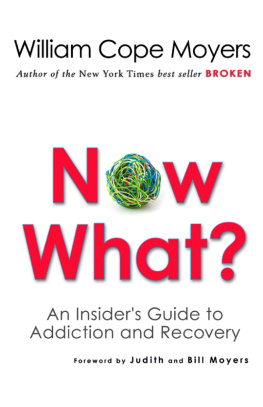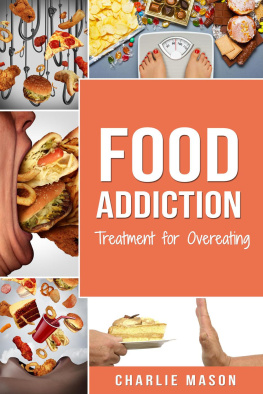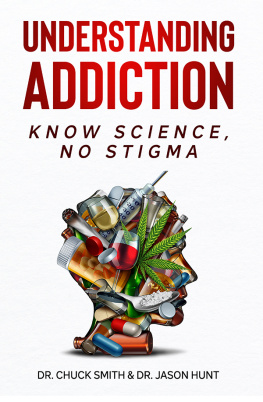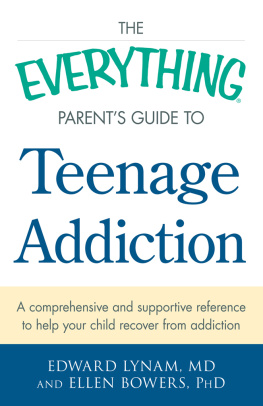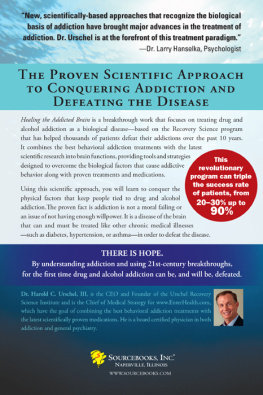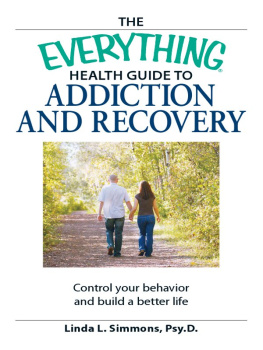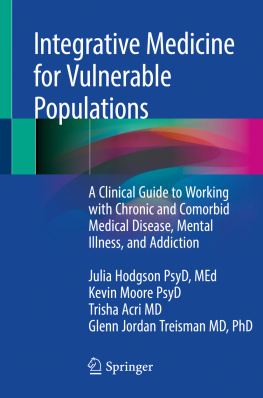Thank you very much for the kind introduction. Im very happy to be here. We have a long association with the unions, particularly with my dear friend, Steve Levine. Steve chairs the Communication Workers of Americas Northern California Member Assistance Program and directs Plaza House, a sober living facility in Oakland, California, as well as serving in several other capacities for LAP and CWA. He and I are very close friends, and hell also serve as a local reference for those of you who are interested in any of the follow-up literature.
Ive had a really interesting time this summer. I just came from the Hobo Roundup, a recovery gathering in Bozeman, Montana. Ive been in recovery for many years, as has my wife, and we were visiting Arch Wright and his wife, who are developing a recovery program for young adults in Bozeman, based on a holistic approach with a focus on exercise, diet, and twelve-step fellowship. There were about 600 people thereall of us in recovery. How many of you know Bozeman, Montana? Its beautiful, and there were people in recovery and from twelve-step fellowships all over that area. There also were a very large number of children, which I found particularly gratifying as a parent and a grandfather. Many children in addicted families attended this event. Now, I certainly want to support what the speaker said about the importance of family. Addiction is a family disease.
Prior to that, I was at the Virginia Summer Institute for Addiction Studies, lecturing to about 1,000 people on the importance of embracing the current changes in healthcare reform and parity in relation to the treatment of addiction. Im going to use some of that information as my introductory remarks before I get down to the specifics. We have prepared a PowerPoint presentation, and I have handouts on each of the topics. There are a number of publications that are relevant to these topics. I know that you are all involved in this area and what I want to emphasize is that I hope you will use this as an opportunity to keep up-to-date on the latest advances. Its a very rapidly changing field, and it is important that you keep up on the latest advances as well as know who to contact, if you want additional information.
Addiction medicine is now a board-certified specialty. Were mainstream now. I cant emphasize how important that is. I first started the Haight Ashbury Free Clinics in the 1960s. I know some of you remember this. The phrase, If you remember the 60s, you werent there, has been attributed to Robin Williams, Paul Kantner, and many others. That was the era of love, sex, and rock and roll, and when I first started the Haight Ashbury Clinics it was illegal for a doctor to treat an addict with prescription medication. In other words, you were committing a felony if you were a doctor who treated an addict. The kinds of treatment we provide today could not happen. Im talking about the recovery people in the audience. I dont want to break your anonymity, but I know some of you are out there. Back then, you were criminals, and we were guilty of aiding and abetting a crime by taking care of you. Thats the way it was.
Now you have organizations; you have leadership up here appealing to open forums like this. What an incredible advance. But here Im speaking to the younger people in the audienceyou must learn this history, because the way it is now is not always the way it was. In fact, for those of you who know San Francisco, it is really hard to get arrested in San Francisco. You can probably get arrested if you smoke a cigarette in a restaurant, but in the 60s there was a doctor who detoxed a heroin addict in another part of California, and I got a call from Dr. Jess Bromley who told me this doctor had just been arrested. I said, Well, Im committing about 100 felonies a day because we had set up the first community-based heroin detox program at the Haight Asbury Clinic.
So that was one of the beginnings of the field of addiction medicine. The founding principle of our Haight Ashbury Free Clinic was Healthcare is a right, not a privilege. I mention that because after this historic landmark decision in which the Supreme Court declared that the Patient Protection and Affordable Care Act universal mandate is constitutional, healthcare reform along with parity for addiction treatment is now the law of the land. Representative Nancy Pelosi, with whom we are very close, said, Now healthcare is a right, not a privilege, and I got a call from the press asking, Well, where does that saying come from? I thought it was from Clintons speechwriter, and I said, It came from the Haight Ashbury Free Clinics. Remember, Healthcare is a right, not a privilege. We were long on fantasy, not too much committed to reality other than that there were a number of suffering addicts and alcoholics who we thought should be treated in a nonjudgmental fashion.
Mr. Freckman of the musicians union said that music cares. Well, our clinic was built on rock and roll. We found in dealing with the hippie generation that love needs care. It wasnt respectable to treat addicts. The Grateful Dead, Jefferson Airplane, Janis Joplin, Big Brother and the Holding Company, Creedence Clearwater Revival, Santana, and George Harrison of the Beatles funded our clinic, because what respectable organization would fund anything that treated addicts? Who would even think about having an organization like this? Working people treating addicts? Are you crazy? Addicts belong in jail. Most of them use heroin. So we came out of that rock-and-roll world. Our Haight Ashbury Clinics developed rock medicine. We deliver medical and crisis intervention services at rock concerts and other large events, and we take care of a large number of our musicians. I dont think its any secret that musicians have problems. We do about 750 concerts and events per year and have about 1,000 medical volunteers, and we now are repaying that debt to the world of music for what they did for us in the beginning.
Ive practiced addiction medicine now for almost fifty years. As Ive said, I came out of an era when the practice of addiction medicine was not a respectable specialty. It just turned out that I lived in the Haight Ashbury. For those of you who know San Francisco, the Haight Ashbury borders the University of California Medical School (UC), and I was a professor at UCSF for forty-five years. But I got involved in this chemi-culture civil rights movement, taking care of addicts. One of my professors said, David, where did you go wrong? You were such a promising young medical student. Physicians who treated addicts in the 60s were considered crazy or off-the-wall or whatever.
That all began to change in the 70s. And why? The Vietnam War. The Vietnam vets came back, and one of the great tragedies of modern US society in the 1970s was that they were treated so very poorly. They were alienated from the Veterans Administration (VA). They came to the Haight Ashbury Free Clinics because we treated addiction in a nonjudgmental fashion, and suddenly the government said, We want to fund where the vets go. And the vets said, We go to this place called the Haight Ashbury Free Clinics. So suddenly I had all these government officials coming around trying to give us money. I did the same thing at the same place year after year after year. Last year you were trying to arrest me and this year you want to give me money. What changed? The perception of who the addict is, changed. In other words, in the 60s they were a bunch of hippie low-lifes and in the 70s they were Vietnam vets coming out of an unpopular war.
The practice of addiction medicine has continued to evolve. We are based on the principle that addiction is a brain disease influenced by genetic and environmental factors. The target organ of addiction is the brain. You also have to take into consideration the cultural aspects of addiction. We cant say addiction is a disease if you are white middle class, but its a crime if you are poor and nonwhite, any more than you would say that diabetes is a disease if you are white middle class, but its a crime if you are poor and nonwhite. In other words, it is important to understand the origins of addiction medicine, particularly for the younger people coming in because we are, and for some time are going to be, in the middle of that conflict again with vets coming back from Iraq and Afghanistan.


